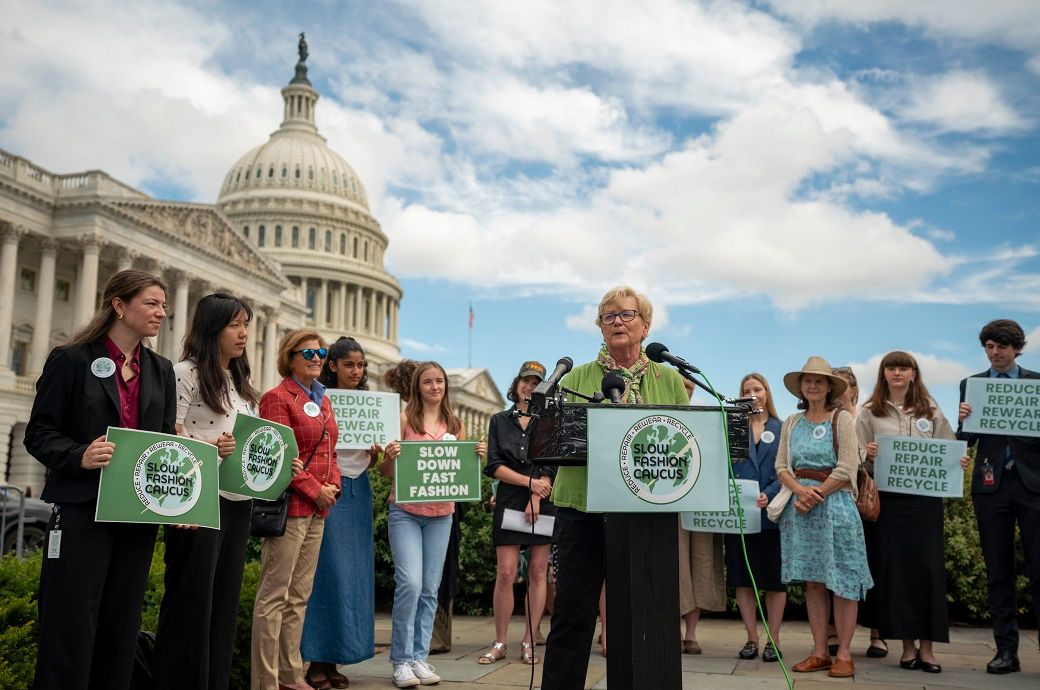
US Congresswoman Chellie Pingree (D-Maine), ranking member of the House Appropriations Interior and Environment Subcommittee, along with Representatives Marie Gluesenkamp Perez (D-Wash) and Sydney Kamlager-Dove (D-Calif), has announced the formation of the first-ever Congressional Slow Fashion Caucus. This initiative aims to curb fast fashion pollution through climate-smart policies. The announcement was made during a launch event and press conference on Capitol Hill, attended by sustainable fashion industry leaders and stakeholders, including Patagonia, thredUp, and the Garment Worker Center.
The Slow Fashion Caucus is built on several key principles to support a circular economy for textiles. One principle involves incentivising the reuse, repair, and recycling of textiles. While the apparel industry is a significant contributor to greenhouse gas emissions, it also holds the potential to be part of the solution. Public policies that incentivise second-hand purchases or participation in rental models can facilitate environmentally friendly practices for companies and consumers, Chellie Pingree's office said in a press release.
Another principle focuses on developing circular economy policies aimed at preventing textiles from becoming waste by designing products that can be reused, repaired, and recycled. These policies are essential for reducing natural resource consumption in the apparel industry.
Promoting reuse and recycling infrastructure is another critical principle. The current systems for collecting, reusing, and recycling textiles are inadequate, and there is a need for more consistent, convenient, and widespread infrastructure to manage the quantity and quality of textiles needed for economical reuse and recycling. Building public awareness is also crucial. There is a need for greater education on the environmental impacts of fast fashion and the benefits of supporting a circular economy for textiles.
Reviving US textile production is another goal. With the changing economics of global textile production and increasing consumer demand for sustainable products, there is a push to bring more textile and apparel production back to the USA. Supporting the use of more sustainable fibres, such as cotton, flax, hemp, wool, and alpaca, and reducing the use of virgin materials can help decrease environmental impacts. Additionally, expanding federal initiatives is vital. President Biden's administration aims to reduce US greenhouse gas emissions by 50-52 per cent from 2005 levels by 2030 and limit global warming to 1.5 degrees Celsius. Existing government efforts can be further leveraged to curb fast fashion and promote sustainability.
Pingree founded the Congressional Slow Fashion Caucus to create policies that promote the reduction, repair, reuse, and recycling of textiles. In June 2023, Pingree and Rosa DeLauro (D-Conn), Ranking Member of the House Appropriations Committee, urged the US Government Accountability Office (GAO) Comptroller General Gene Dodaro to outline ways the fashion industry and the Environmental Protection Agency (EPA) can better manage discarded clothing and textile waste. The congresswomen highlighted the rise of the ‘fast fashion’ industry as a primary driver of textile waste pollution. The Slow Fashion Caucus represents a significant step towards creating a more sustainable and environmentally friendly fashion industry in the USA.
Chellie Pingree, founder and chair of the Slow Fashion Caucus, said: “For too long, the so-called ‘fast fashion’ industry has been given free range to pollute our planet, exploit workers, and shortchange consumers. In fact, textile waste is one of the fastest-growing waste streams in the US and is responsible for more carbon emissions than all international flights and maritime shipping combined. The launch of our Slow Fashion Caucus marks a new era in the fight against climate change and sends a clear message that Congress will not stand by as the harmful fast fashion industry flies under the radar to destroy our planet.
“It doesn’t have to be this way. As lawmakers, we can create incentives for the apparel industry and consumers to reduce natural resource consumption and engage in reusing, repairing, rewearing, and recycling textiles. I am eager to get to work and thankful for the widespread support of sustainable style advocates, industry leaders, and, of course, my fellow Members of Congress who are joining me in this new effort to rein in fast fashion pollution. This is just the beginning!”
“High-quality American-made clothing isn’t just inherently fashionable – it’s a core part of building wealth in the middle class. When I have to replace work boots every few months, rather than a quality pair that can last for years, my family loses out. The purest form of environmentalism is to use less and be a good steward of your stuff – rather than buying new clothing that’s designed to be disposable,” said Gluesenkamp Perez.
Fibre2Fashion News Desk (DP)